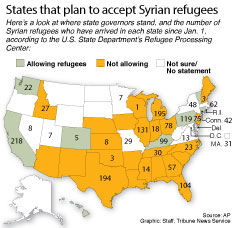US officials defend decades-old refugee resettlement program

November 17, 2015
Obama administration officials pushed back Tuesday at an effort by more than half the nation’s governors to block entry for Syrian refugees, saying the campaign has no legal grounding and threatens a decades-old tradition of bipartisan support for giving sanctuary to the world’s most vulnerable.
U.S. officials gave several briefings throughout the day to counter a Republican-led movement to bar resettlement for Syrian refugees based on fears that extremists will infiltrate the program and carry out attacks like the ones in France and Lebanon last week. Resettlement personnel have stressed that stringent security vetting already is in place — each case takes around two years to process and only about half the applicants are accepted in the end.
The explanations so far haven’t satisfied at least 30 Republican and one Democratic governor — who have adopted stances ranging from demands for a federal review of the program to vows to “suspend” resettlement of Syrians in their states.
Advertisement
Meanwhile, Republican congressional leaders, feeling pressure from constituents and eager to put political heat on President Barack Obama, moved Tuesday to restrict and even bar Syrian refugees from entering the United States. They began crafting legislation and spoke of attaching it to a bill to keep the government running after Dec. 11.
If no spending bill is approved by that date, parts of the government could shut down. While that’s highly unlikely, the prospect at least created a deadline for acting on the refugee issue.
Many Republicans embraced calls by House Speaker Paul Ryan, R-Wis., and Senate Majority Leader Mitch McConnell, R-Ky., to temporarily suspend the refugee program.
Idaho Gov. C.L. “Butch” Otter, using language similar to other Republican governors, wrote in a letter Monday to Obama that it makes no sense for the United States “to allow people into our country who have the avowed desire to harm our communities, our institutions and our people.”
The announcements were prompted by reports that at least one suspect in the massacre Friday in Paris landed in Europe by using an assumed Syrian identity and entering Greece alongside refugees in October. The man’s real identity has yet to be confirmed. Authorities have identified five of the eight suspected militants behind the Paris attack as French nationals.
Humanitarian groups dismissed the Republicans’ better-safe-than-sorry approach as alarmist, noting that Syrian refugees already undergo more screening than any other refugees. In addition, U.S. officials say, half of those resettled in the United States are children; just 2 percent are what the government terms “men of combat age.”
“If ISIS had hoped their attacks would provoke the U.S. into reacting with small-minded panic, governors are helping them get their wish,” Naomi Steinberg, director of Refugee Council USA, said on a conference call Tuesday with reporters.
Advertisement*
At the State Department, spokesman Mark Toner said governors lack the legal authority to reject refugees, whose entry is facilitated on the federal level and who have complete freedom to travel once inside the United States. “Theoretically,” Toner added, states could refuse to accept federal resettlement funds, which would make work harder for the nonprofits, churches and civic groups that help new arrivals adjust to life in their new communities.
“We hope it never comes to that,” Toner said.
On a conference call with reporters, U.S. officials, speaking on condition of anonymity as per the administration’s protocol, defended the resettlement program, which began in the mid-1970s and has provided sanctuary to more than 3 million people.
Nonprofits that work with the government meet weekly to determine where to send refugees. Determinations start with whether the refugees already have relatives anywhere in the United States. Other factors include whether there are special medical needs such as a burn hospital or a cancer treatment center. The 180 communities that typically receive refugees are given a heads up, officials said, with resettlement personnel alerting local authorities, schools, mayors, police chiefs and health officials.
Traditionally, officials said, the program has enjoyed strong support from both parties as well as a grass-roots network with “incredible quiet support from coast to coast because so many Americans are involved in ways big and small to make this program successful.”
“The thing I most fear about this current discussion going on in the United States is that we will lose the bipartisan support for this program that it has enjoyed for decades, through Democratic administrations, through Republican administrations, through different majorities in the House and Senate,” one official said. “And so this is a very precious thing, I think, and it’s — in the current day and age — it’s been a rare thing.”
(Eleanor Mueller of the Washington Bureau contributed.)
(c)2015 McClatchy Washington Bureau
Visit the McClatchy Washington Bureau at www.mcclatchydc.com
Distributed by Tribune Content Agency, LLC.
Advertisement







